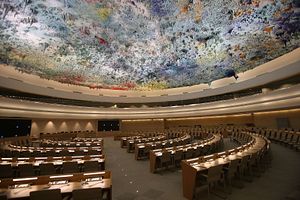As the UN Human Rights Council’s (HRC) 34th session continues, debate on Sri Lanka has been heating up. Another HRC resolution will probably be passed on the island nation later this month and the administration of President Maithripala Sirisena is expected to cosponsor the resolution.
It would be easy to be upset or frustrated with recent HRC interventions on Sri Lanka. Previous resolutions haven’t worked very well and it’s fair to think that yet another resolution might be largely ineffectual too. Relatedly, some may sense that another resolution which is cosponsored by Colombo would be unhelpful because it may give a veneer of legitimacy to a transitional justice process which is not necessarily supported by large segments of Sri Lankan society or the country’s political leadership. Nevertheless, in terms of multilateral efforts in this area, the ongoing HRC process is really the only game in town.
Some have called for Sri Lanka to now be referred to the International Criminal Court (ICC) through a UN Security Council mandate. Those making this request have also compared such a scenario with the way in which the UN has recently engaged with North Korea.
Comparing Sri Lanka (a country which holds regular elections and has always been, to varying degrees, a democracy) with North Korea (a totalitarian state and the most closed society in the world) is unhelpful and inappropriate. Besides, the UN Security Council hasn’t referred North Korea to the ICC, so the scenario that’s been set out by certain people about how Sri Lanka could be referred to the ICC isn’t just wildly unrealistic, it doesn’t even apply to North Korea.
What’s particularly troubling now is that various parliamentarians from the Tamil National Alliance (TNA), the principal Tamil political grouping in the country, have also endorsed this ICC call. That suggests that the idea is gaining traction in Sri Lanka.
Understandably, the victims of the island’s brutal civil war are frustrated and deserve justice. Nonetheless, it’s hard to see how distorting the facts and launching a campaign which has no chance of success is helpful for these people, the group which has essentially suffered the most as a result of the war and who continue to face tremendous challenges in post-war Sri Lanka.
People claiming that the UN General Assembly should immediately put Sri Lanka on the UN Security Council’s agenda so that an ICC referral could be mandated could clarify a few things to support their case.
For starters, what would be the timeline for all of this happening? What would lead anyone to believe that such a scenario is plausible in the present context? Besides, given the fact that North Korea hasn’t been referred to the ICC by the UN Security Council, doesn’t that blow a hole through the comparison?
There’s nothing wrong with making theoretical arguments or presenting unlikely scenarios for consideration. There is, however, a real danger in conflating political fantasies with genuine policy options at arguably important diplomatic moments.
To restate the obvious, Sri Lanka isn’t North Korea. The call for an immediate ICC referral on Sri Lanka is disingenuous and misleading. It should not – under the circumstances – be taken seriously.

































